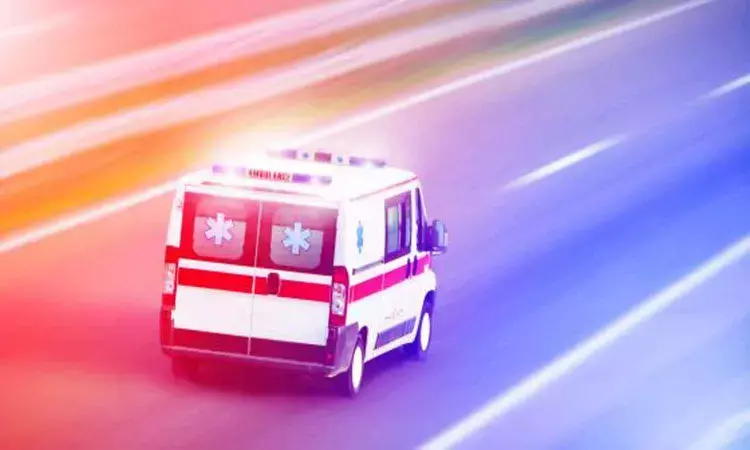- Home
- Medical news & Guidelines
- Anesthesiology
- Cardiology and CTVS
- Critical Care
- Dentistry
- Dermatology
- Diabetes and Endocrinology
- ENT
- Gastroenterology
- Medicine
- Nephrology
- Neurology
- Obstretics-Gynaecology
- Oncology
- Ophthalmology
- Orthopaedics
- Pediatrics-Neonatology
- Psychiatry
- Pulmonology
- Radiology
- Surgery
- Urology
- Laboratory Medicine
- Diet
- Nursing
- Paramedical
- Physiotherapy
- Health news
- Fact Check
- Bone Health Fact Check
- Brain Health Fact Check
- Cancer Related Fact Check
- Child Care Fact Check
- Dental and oral health fact check
- Diabetes and metabolic health fact check
- Diet and Nutrition Fact Check
- Eye and ENT Care Fact Check
- Fitness fact check
- Gut health fact check
- Heart health fact check
- Kidney health fact check
- Medical education fact check
- Men's health fact check
- Respiratory fact check
- Skin and hair care fact check
- Vaccine and Immunization fact check
- Women's health fact check
- AYUSH
- State News
- Andaman and Nicobar Islands
- Andhra Pradesh
- Arunachal Pradesh
- Assam
- Bihar
- Chandigarh
- Chattisgarh
- Dadra and Nagar Haveli
- Daman and Diu
- Delhi
- Goa
- Gujarat
- Haryana
- Himachal Pradesh
- Jammu & Kashmir
- Jharkhand
- Karnataka
- Kerala
- Ladakh
- Lakshadweep
- Madhya Pradesh
- Maharashtra
- Manipur
- Meghalaya
- Mizoram
- Nagaland
- Odisha
- Puducherry
- Punjab
- Rajasthan
- Sikkim
- Tamil Nadu
- Telangana
- Tripura
- Uttar Pradesh
- Uttrakhand
- West Bengal
- Medical Education
- Industry
Stringent driving restrictions not needed for Patients with syncope: JAMA

Canada: Patients who presented to the emergency department (ED) with their first syncope had the same risk of a subsequent crash as the usual ED patient, says an article published in the Journal of American Medical Association - Internal Medicine.
Medical driving restrictions are inconvenient, but syncope recurrence while driving can result in a Motor Vehicle Crash (MVC). There is a scarcity of empirical data to support current driving limitations following syncope. As a result, John A. Staples and colleagues undertook this study to investigate MVC risk among patients entering the emergency room after experiencing first-episode syncope.
In British Columbia, Canada, a population-based, retrospective observational cohort study of MVC risk after first-episode syncope was conducted. Patients presenting to any of six urban emergency departments for syncope and collapse were age- and gender-matched to four control patients presenting to the same ED in the same month for a diagnosis other than syncope. Patients' emergency department medical records were connected to administrative health information, driving histories, and crash reports. Crash-free survival among syncope patients was then compared to that of matched control patients. Data analysis was carried out between May 2020 and March 2022. The primary outcome was the inclusion in an MVC within a year of the index ED visit. Insurance claim data and police crash records were used to identify crashes.
The key findings of this study were as follows:
1. There were 43 589 patients in the research group.
2. At baseline, crude MVC incidence rates were greater in both the syncope and control groups than in the general population.
3. In the year following the index ED visit, the syncope group had 846 first crashes and the control group had 3457 first crashes, demonstrating no meaningful difference in later MVC risk.
4. Subsequent crash risk was not significantly enhanced in the first 30 days following the index ED visit or among subgroups at increased risk of serious outcomes after syncope.
In conclusion, the authors found this data suggest that stricter driving restrictions following syncope may not be necessary.
Reference:
Staples, J. A., Erdelyi, S., Merchant, K., Yip, C., Khan, M., Redelmeier, D. A., Chan, H., & Brubacher, J. R. (2022). Syncope and the Risk of Subsequent Motor Vehicle Crash. In JAMA Internal Medicine. American Medical Association (AMA). https://doi.org/10.1001/jamainternmed.2022.2865
Neuroscience Masters graduate
Jacinthlyn Sylvia, a Neuroscience Master's graduate from Chennai has worked extensively in deciphering the neurobiology of cognition and motor control in aging. She also has spread-out exposure to Neurosurgery from her Bachelor’s. She is currently involved in active Neuro-Oncology research. She is an upcoming neuroscientist with a fiery passion for writing. Her news cover at Medical Dialogues feature recent discoveries and updates from the healthcare and biomedical research fields. She can be reached at editorial@medicaldialogues.in
Dr Kamal Kant Kohli-MBBS, DTCD- a chest specialist with more than 30 years of practice and a flair for writing clinical articles, Dr Kamal Kant Kohli joined Medical Dialogues as a Chief Editor of Medical News. Besides writing articles, as an editor, he proofreads and verifies all the medical content published on Medical Dialogues including those coming from journals, studies,medical conferences,guidelines etc. Email: drkohli@medicaldialogues.in. Contact no. 011-43720751


